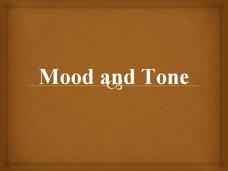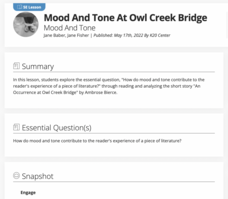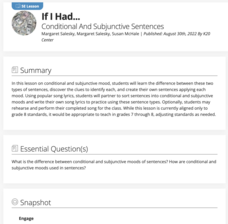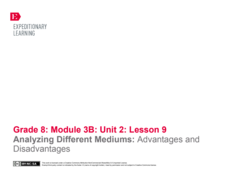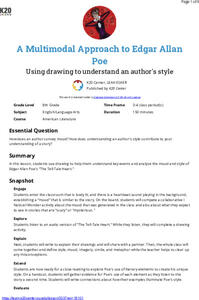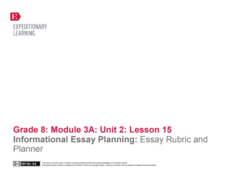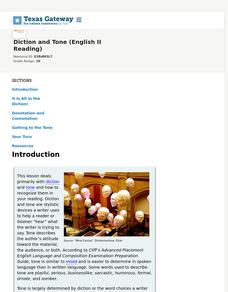Amani Project
Teach the Mood Meter
The third activity from the Amani Project has youths create a Mood Meter. The colorful meter, divided into red, yellow, blue, and green squares, lets participants indicate not only how they are feeling but also permits them to indicate...
Lafayette Parrish School System
Teaching Tone and Mood
Tone and Mood are not synonymous! Introduce young readers to these literary devices with a series of exercises that not only point out the significant differences between the terms but also shows them how to identify both the tone and...
District 186 Springfield Public Schools
Tone, Mood, Theme, and Motif
It's all well and good when you're asked to identify a speaker's tone using his or her body language, facial expression, and pitch and emphasis. Identifying the tone of a written passage is another challenge entirely. Check out an...
Discovery Education
Mood Music!
Grouchy? Sad? Here's a great resource that shows kids how music can be used to lift their spirits. Kids collect and chart data on the effects of music on emotions. After analyzing the results of their experiment, they develop...
Plainfield Public School District
Mood and Tone
"It was a dark and stormy night. Perfect for making Christmas cookies." Distinguishing between the mood of a piece and the tone can be tricky, but with the help of this presentation viewers quickly see and are able to identify the...
K20 LEARN
Mood and Tone at Owl Creek Bridge: Mood and Tone
Two versions of movie trailers for the film Mary Poppins launch a supercalifragilisticexpialidocious lesson about how mood and tone impact a reader's experience of work. Using the provided list, readers identify the words that create the...
K20 LEARN
If I Had... Conditional and Subjunctive Sentences
Lines from popular songs are used to teach middle schoolers about conditional and subjunctive moods. Groups engage in a card sort activity to identify conditional and subjective sentences and then partners draft sentences of each type....
Amani Project
Harmony Break! Mood Shifting
The fifth activity in the Amani Project series, another Harmony Break, has participants demonstrate a mood shift. They begin by drumming in a way that indicates their current feelings. They then model a change in mood by transitioning...
Overcoming Obstacles
Identifying Emotions in Conflicts
The takeaway from the second lesson in the Resolving Conflicts module is that "conflict is like an iceberg" in that we only see a small portion of what's involved in conflicts. Participants learn to identify the many unseen feelings that...
Deer Valley Unified School District
Close Reading: Analyzing Mood and Tone
The AP Literature and Composition exam is all about close reading. Test takers are presented with a passage and asked to analyze how an author uses literary devices to create a desired effect. Prepare your students for the exam with a...
EngageNY
Analyzing Author’s Craft: Analyzing Hillenbrand’s Language Techniques
Young readers take a look at the conditional and subjunctive moods authors use. The Conditional and Subjunctive Mood handout defines the types of moods and gives them examples and practice. They then work with partners to identify...
Pace University
Short Stories
A reading of Kevin Lamb's short story "Lost in the Woods" launches a study of how writers use elements such as foreshadowing, mood, character development, setting, and conflict to engage readers. Class members then demonstrate what they...
Teaching Tolerance
Using Photographs to Teach Social Justice | Exposing Gender Bias
Young sociologists are asked to read two photographs, identifying how the photographer uses point of view, color, pose, light, and shadow to express a stereotype of women or to challenge those stereotypes. Partners then create their own...
Brigham Young University
Putting Ideas Together
As part of their study of set design, theater arts young scholars put together what they have learned so far and create a thumbnail sketch of a set that they feel captures the style and mood they want to project.
K20 LEARN
Watch Your Tone: Tone Analysis Through Music And Nonfiction
Identifying the tone of a piece of writing or the author's attitude toward the subject matter can be difficult for learners. Simplify the process with a lesson that begins with skits, moves to songs and their lyrics, and then to passages...
Office of Migrant Education
Poetry: Form, Syllables, Mood, and Tone
Looking for a resource to introduce homeschoolers and other out-of-class learners to the elements of poetry? Check out this packet that defines and illustrates important poetry terms.
Core Knowledge Foundation
Unit 7: Poetry
Over the course of a 12-lesson language arts unit, young scholars analyze a variety of poems taking a close look at figurative language and tone. They learn to compare and contrast, improve comprehension, and identify settings. To...
EngageNY
Analyzing Different Mediums: Advantages and Disadvantages
How do authors play to people's moods? After briefly reviewing mood using a Conditional and Subjunctive Mood handout, learners practice identifying conditional and subjunctive sentences in the Montgomery Bus Boycott speech before reading...
Nasher Museum of Art at Duke University
Are You My Mother? An Opinion Writing Unit
During a five-day lesson, scholars analyze written and visual art—primarily the poem, Mother to Son by Langston Hughes— identify facts, and write opinions. Learners read the poem several times, discuss, write, compare and...
Amani Project
Harmony Break! Finding Emotions With Music
Gather the entire family (or class members) for a fun Harmony Break! A volunteer thinks of a color from their Mood Meter that they will express by singing, playing an instrument, or performing a dance. After the performance, the audience...
K20 LEARN
A Multimodal Approach To Edgar Allan Poe Using Drawing To Understand An Author's Style
True! Poe's "The Tell-Tale Heart" makes readers nervous. But how? Young scholars create a drawing while listening to a reading of Poe's eerie tale to understand how writers create the mood of their stories and what their writing style...
Curated OER
Those Wacky Greek and Roman Gods: A Quick Cheat-Sheet
Here's a handy two-page reference that briefly identifies major Greek and Roman mythological figures.
EngageNY
Informational Essay Planning: Essay Rubric and Planner
Pupils walk through the process of writing essays for their final assessment of Unbroken. They begin by reviewing the rubric using Rubric Criteria strips that assign a portion of the rubric to each pair of learners. They then participate...
Texas Education Agency (TEA)
Diction and Tone (English II Reading)
Words carry baggage. In addition to their literal, denotative meaning, words also carry the weight of the associations and connotations attached to the word—the connotations of words writers use to create the tone of a piece. An...
Other popular searches
- Identifying Mood and Tone
- Identifying Mood in Reading
- Identifying Mood Tone
- Identifying Mood in Poetry
- Identifying Mood in Passages
- Identifying Mood Worksheet
- Identifying Mood Inpoetry




